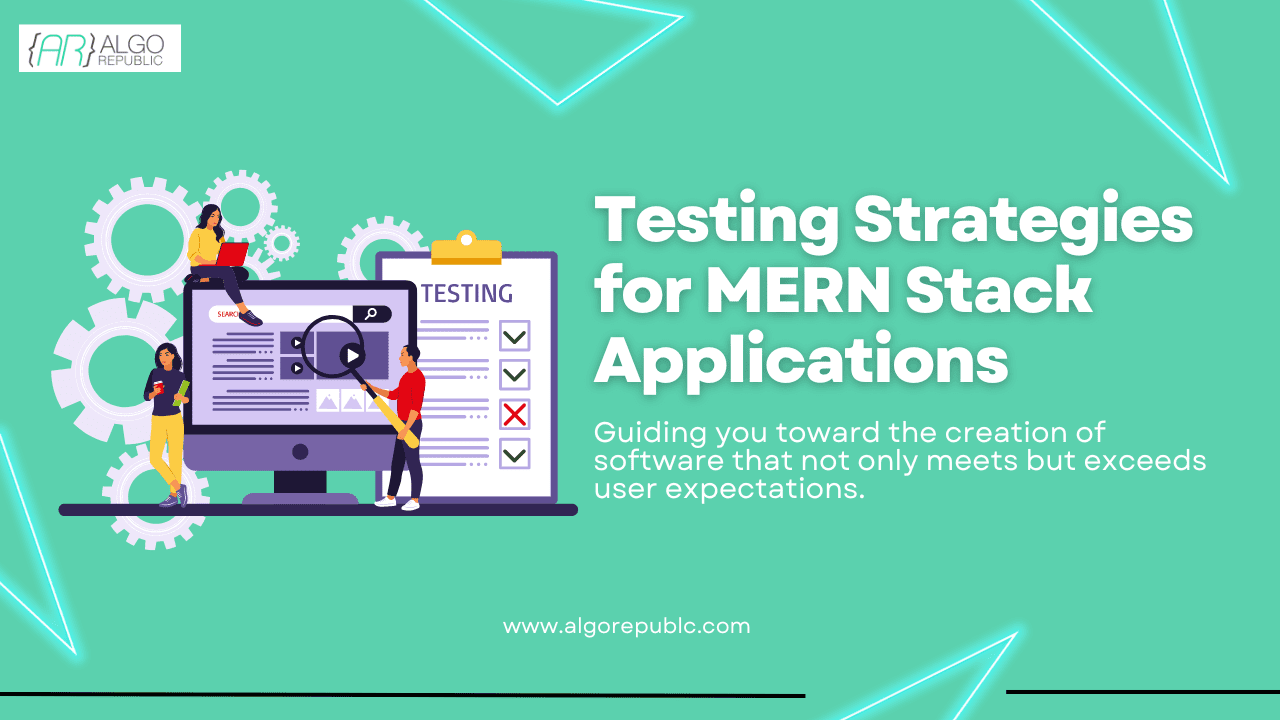Table of Contents
The development journey of MERN stack applications is both exhilarating and challenging. As your application grows and becomes more complex, ensuring its reliability and quality becomes paramount. This is where a comprehensive testing strategy enters the picture. In this blog post, we will dive deep into the world of testing for MERN stack applications, shedding light on key concepts and sharing practical insights to help you build rock-solid software.
Why Testing MERN Stack Matters:
Testing serves as your safety net in the world of software development. It enables you to catch and address bugs before they reach your users, ensuring that your application behaves as expected. Additionally, it simplifies the process of adding new features and making changes, as you can make modifications with confidence, knowing that existing functionality remains intact.
Types of MERN Stack Testing:
Unit Testing: Unit testing focuses on individual units of code, typically functions or methods. In the context of a MERN application, this might involve testing a specific route in Express.js or examining the functionality of a React component in isolation.
Integration Testing: Integration testing takes a broader approach by examining how different parts of your application interact and work together. For a MERN stack, this might entail testing how your React front end communicates with your Express back end or how your Node.js server interacts with MongoDB.
End-to-End (E2E) Testing: E2E testing simulates user interactions with your application. Tools like Cypress or Selenium allow you to create scripts that mimic real user behavior, such as clicking buttons, filling out forms, and navigating through your app.
Setting Up Testing:
To embark on your testing journey within a MERN stack application, consider harnessing popular testing libraries like Jest (for unit testing), Supertest (for API testing), and React Testing Library (for testing React components). These tools serve as a solid foundation for constructing your testing suite, allowing you to systematically build confidence in your application’s reliability.
Testing the Back End:
In the back end, you’ll want to conduct thorough testing of your API routes, middleware, and database interactions. For testing Express.js routes, Supertest is a valuable tool. It facilitates the sending of HTTP requests to your routes and empowers you to make assertions about the responses.
In practical terms, this means that you can simulate client requests to your API endpoints and verify that they return the expected results.
Testing the Front End:
When it comes to testing React components, React Testing Library emerges as a powerful ally. This library encourages a user-centric testing approach, focusing on how components are rendered and how they interact with user input.
For instance, you can use React Testing Library to render a component, simulate user actions (such as clicking buttons or entering text), and then assert that the component behaves as expected in response to those actions.
Automating Testing:
To maintain consistency and rigor in your testing efforts, consider setting up automated test runners. These runners execute your tests automatically whenever you make changes to your code, helping you catch regressions early and ensuring that your tests remain up to date.
Continuous Integration (CI) tools, such as Travis CI or GitHub Actions, can be invaluable for automating the testing process. By integrating CI into your workflow, you can ensure that tests are run automatically whenever code changes are pushed to your repository. This practice promotes a culture of continuous testing and helps catch issues before they reach production.
Conclusion:
In the realm of MERN stack application development, testing is not just a good practice; it’s an indispensable part of crafting reliable software. Whether you’re writing unit tests to validate individual code units, integration tests to ensure smooth interactions between components, or end-to-end tests to simulate real user experiences, a well-rounded testing strategy is your key to success.
As your MERN application continues to evolve, a robust testing strategy with AlgoRepublic will serve as your compass, guiding you toward the creation of software that not only meets but exceeds user expectations.
